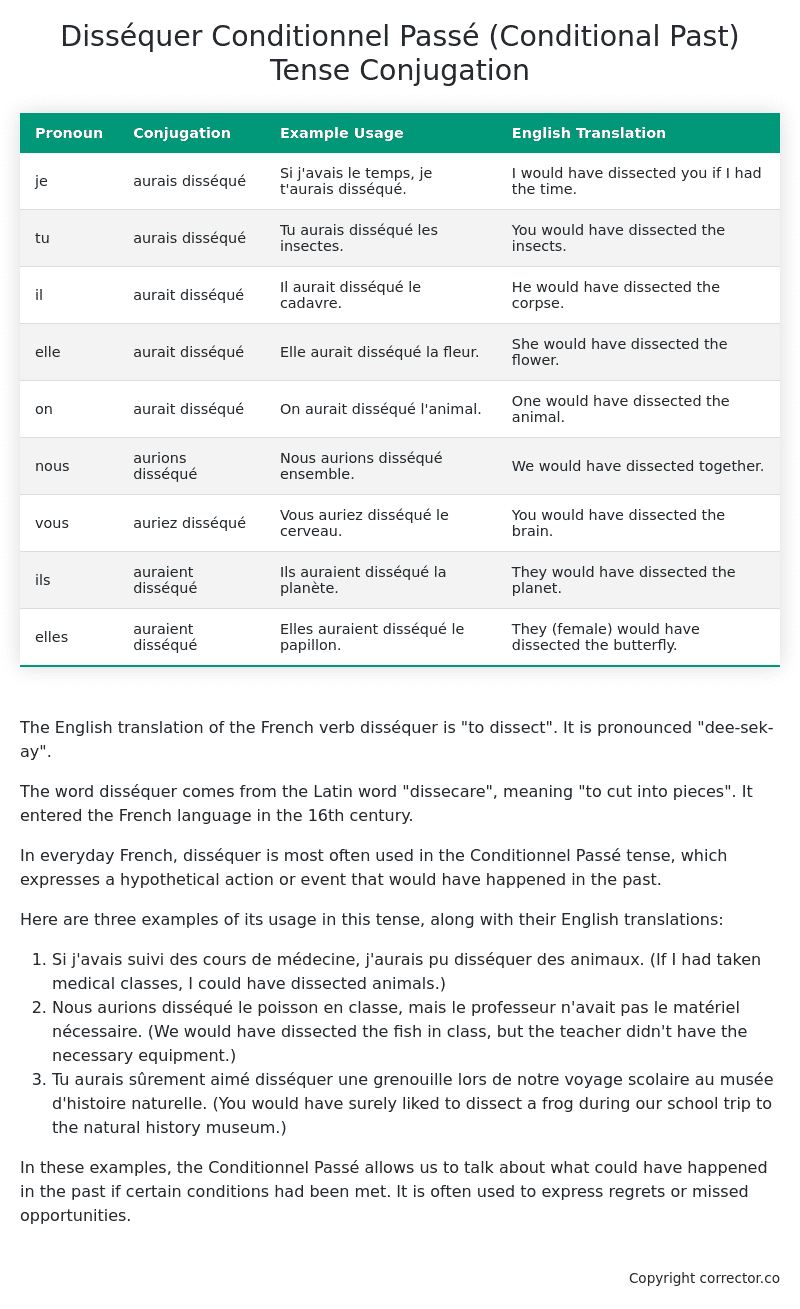Conditionnel Passé (Conditional Past) Tense Conjugation of the French Verb disséquer
Introduction to the verb disséquer
The English translation of the French verb disséquer is “to dissect”. It is pronounced “dee-sek-ay”.
The word disséquer comes from the Latin word “dissecare”, meaning “to cut into pieces”. It entered the French language in the 16th century.
In everyday French, disséquer is most often used in the Conditionnel Passé tense, which expresses a hypothetical action or event that would have happened in the past.
Here are three examples of its usage in this tense, along with their English translations:
- Si j’avais suivi des cours de médecine, j’aurais pu disséquer des animaux. (If I had taken medical classes, I could have dissected animals.)
- Nous aurions disséqué le poisson en classe, mais le professeur n’avait pas le matériel nécessaire. (We would have dissected the fish in class, but the teacher didn’t have the necessary equipment.)
- Tu aurais sûrement aimé disséquer une grenouille lors de notre voyage scolaire au musée d’histoire naturelle. (You would have surely liked to dissect a frog during our school trip to the natural history museum.)
In these examples, the Conditionnel Passé allows us to talk about what could have happened in the past if certain conditions had been met. It is often used to express regrets or missed opportunities.
Table of the Conditionnel Passé (Conditional Past) Tense Conjugation of disséquer
| Pronoun | Conjugation | Example Usage | English Translation |
|---|---|---|---|
| je | aurais disséqué | Si j’avais le temps, je t’aurais disséqué. | I would have dissected you if I had the time. |
| tu | aurais disséqué | Tu aurais disséqué les insectes. | You would have dissected the insects. |
| il | aurait disséqué | Il aurait disséqué le cadavre. | He would have dissected the corpse. |
| elle | aurait disséqué | Elle aurait disséqué la fleur. | She would have dissected the flower. |
| on | aurait disséqué | On aurait disséqué l’animal. | One would have dissected the animal. |
| nous | aurions disséqué | Nous aurions disséqué ensemble. | We would have dissected together. |
| vous | auriez disséqué | Vous auriez disséqué le cerveau. | You would have dissected the brain. |
| ils | auraient disséqué | Ils auraient disséqué la planète. | They would have dissected the planet. |
| elles | auraient disséqué | Elles auraient disséqué le papillon. | They (female) would have dissected the butterfly. |
Other Conjugations for Disséquer.
Le Present (Present Tense) Conjugation of the French Verb disséquer
Imparfait (Imperfect) Tense Conjugation of the French Verb disséquer
Passé Simple (Simple Past) Tense Conjugation of the French Verb disséquer
Passé Composé (Present Perfect) Tense Conjugation of the French Verb disséquer
Futur Simple (Simple Future) Tense Conjugation of the French Verb disséquer
Futur Proche (Near Future) Tense Conjugation of the French Verb disséquer
Plus-que-parfait (Pluperfect) Tense Conjugation of the French Verb disséquer
Passé Antérieur (Past Anterior) Tense Conjugation of the French Verb disséquer
Futur Antérieur (Future Anterior) Tense Conjugation of the French Verb disséquer
Subjonctif Présent (Subjunctive Present) Tense Conjugation of the French Verb disséquer
Subjonctif Passé (Subjunctive Past) Tense Conjugation of the French Verb disséquer
Subjonctif Imparfait (Subjunctive Imperfect) Tense Conjugation of the French Verb disséquer
Subjonctif Plus-que-parfait (Subjunctive Pluperfect) Tense Conjugation of the French Verb disséquer
Conditionnel Présent (Conditional Present) Tense Conjugation of the French Verb disséquer
Conditionnel Passé (Conditional Past) Tense Conjugation of the French Verb disséquer (this article)
L’impératif Présent (Imperative Present) Tense Conjugation of the French Verb disséquer
L’infinitif Présent (Infinitive Present) Tense Conjugation of the French Verb disséquer
Struggling with French verbs or the language in general? Why not use our free French Grammar Checker – no registration required!
Get a FREE Download Study Sheet of this Conjugation 🔥
Simply right click the image below, click “save image” and get your free reference for the disséquer Conditionnel Passé tense conjugation!

Disséquer – About the French Conditionnel Passé (Conditional Past) Tense
Formation
Common Everyday Usage Patterns
Expressing Unreal Past Scenarios
Polite Requests or Suggestions
Expressing Doubt or Uncertainty
Interactions with Other Tenses
Conditional Present
Indicative Past Tenses
Conditional Future
Summary
Want More?
I hope you enjoyed this article on the verb disséquer. Still in a learning mood? Check out another TOTALLY random French verb conjugation!


